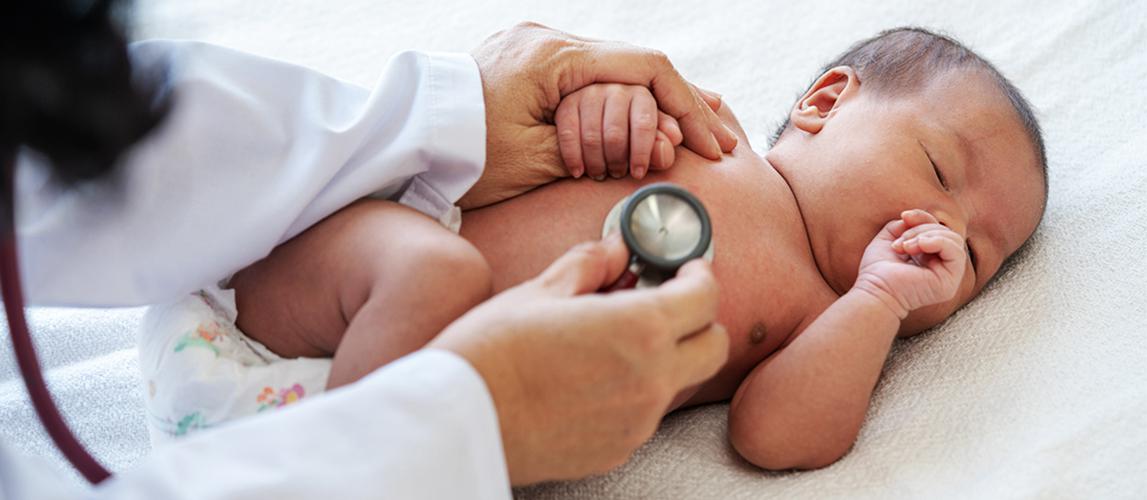First Year of Life

As pediatricians, we see children every day—that’s the joy of this profession. Of course, we usually see children when they are sick, but it’s also very important that we see them when they’re healthy. Wellness checks are our main tool to monitor the growth and development of a child from birth until late adolescence, not only physically but also mentally. We need to ensure that they’re achieving their milestones, looking for red flags that may indicate an underlying problem. As with everything, prevention is better than cure, so if we catch something earlier, we can then address it earlier—which is far better than catching it late.
A good example of this is language acquisition. Research is very clear about what a developing child should be able to express linguistically at each stage in their growth. Sometimes a child may be a bit slower than is normal, and this could be because the child suffers from a condition such as autism spectrum disorder. It could also be due to completely benign reasons—it’s not uncommon for a child growing up in a multilingual household to fall short of their milestones while their speaking skills develop in two or more languages at once. It’s also less of a concern if a child has difficulty expressing him or herself verbally, but is still perfectly capable of understanding complex instructions such as “go into the bedroom and bring me my phone.”
Sometimes a problem can be caught during a wellness check and corrected easily—if you notice that a two-year-old child has the linguistic capacity typical of a one-and-a-half-year-old, there is only a six-month gap between what is expected and what the child is able to do. With special attention this issue may be resolved, whereas if a child does not receive a wellness check until four years old and is discovered to have the developmental level of a two-year-old, that’s a far more challenging problem. If we see things that are not quite right, we advise parents to see a specialist.
During the first year of life, there are many things happening—so the frequency of wellness visits is higher compared to when a child is older. Children should ideally receive the first wellness check straight after birth following being discharged from hospital. This should be followed by checks at one month, two months, four months, six months, nine months and then at 12 months; and then after that, every three months until 18 months; and then at two years, 30 months, and then yearly after that.
In Western countries, screening for illnesses at birth is usually routine, while in Vietnam this is not guaranteed. One example of a congenital condition that will be screened for is hyperthyroidism. If you catch this condition early, medication can be prescribed that should ensure the child leads a normal, healthy life. This is the importance of the well-baby check, to find clues that can help us to intervene and make dramatic changes to improve a child’s lifelong health.
Normally we do wellness checks, especially for younger kids, together with vaccinations. This is a perfect opportunity to discuss with parents any concerns they might have. We can ask about developmental milestones as well as checking nutrition and other physical attributes, such as head circumference. As we administer the vaccinations, we give appropriate advisory guidance on topics such as healthy eating or accident prevention if a child has just started to crawl or walk.
Parents usually appreciate professional advice, although not always—sometimes for cultural reasons we run into differences of opinion. In this culture, an overweight baby might be seen as being healthy and happy, whereas as a doctor I find myself having to warn parents of the potential for heart disease, diabetes, and other serious problems later in life brought on by childhood obesity. I often refer parents of overweight children to a specialist.
So far, I’ve never come across a parent who refuses vaccinations in Saigon, although there are some who choose only certain vaccines that they want and refuse others. Some parents do not understand why we vaccinate against certain diseases here when this is not done in their home country. In fact, it is always recommended to follow the immunization schedule of the country where you are living, because the dangers can vary from place to place. In the case of chickenpox, for example, the best protection is gained by contracting the virus naturally in childhood, so in areas where it is common it is not normal to vaccinate against it. However in Asia, where chickenpox is far less common, it is advisable to vaccinate—contracting the disease naturally later in life, especially during pregnancy, can be a far more serious problem.
International schools here usually specify a list of vaccinations a child must have before being admitted. A physical examination is also required—different schools have different forms, but the format of these wellness checks is generally the same. It used to be the case that we would need to run skin tests and check for TB, but blood and urine testing are no longer required. Usually these kinds of study-placement tests are only asked for by parents sending their children to schools overseas.
Parents should be very careful to ensure their child receives all their wellness checks, especially during the early stages of life. We can monitor physical growth, cognitive skills, eyesight, and a number of issues that are most easily resolved following correct diagnoses as early in life as possible. A child should also visit a dentist six months after the eruption of the first tooth. By looking at the overall picture when a child is well rather than only focusing on healing when he or she is ill, we can help to ensure a healthy passage into adulthood.
Dr. Agnes R. Viay - Pediatrician, Family Medical Practice Ho Chi Minh City
 本ウェブサイトでは、みなさまが快適にご利用いただけるよう、Cookieを使用しています。
本ウェブサイトでは、みなさまが快適にご利用いただけるよう、Cookieを使用しています。